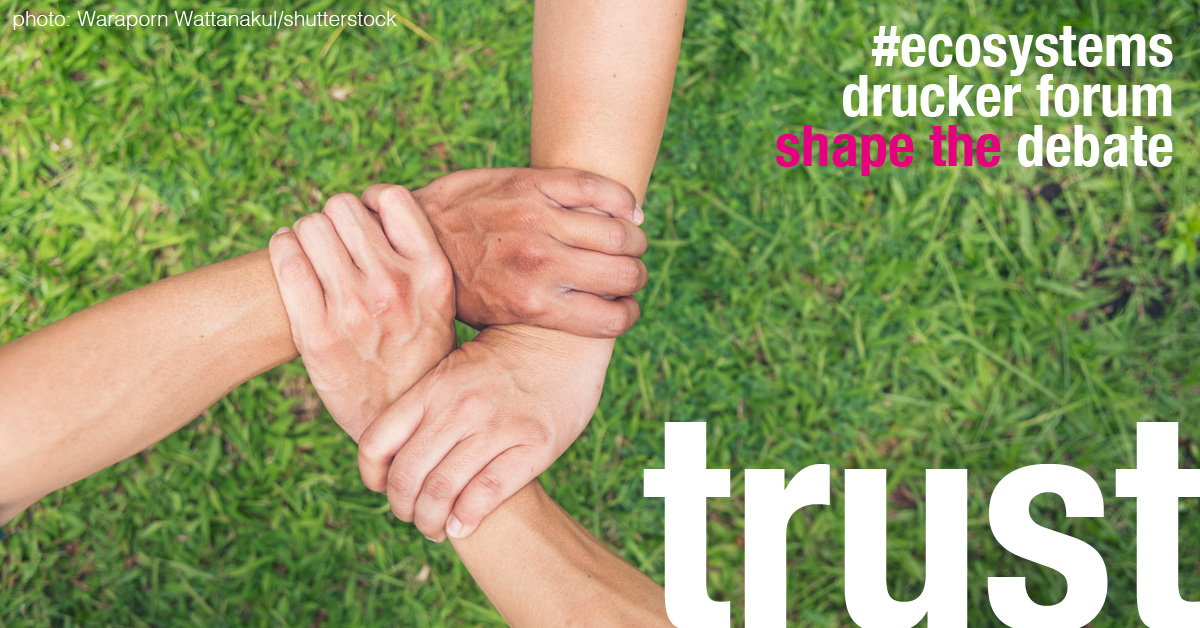
“Any sufficiently advanced technology is indistinguishable from magic” – Clarke’s Third Law
Imagine a senior citizen who wants to sell off her old furniture. A digitally-naïve, trusting individual, who is still excited to try out new technology, she finds an online platform that matches buyers and sellers, and places her advertisement. Voila! A prospective buyer contacts her on the phone, they agree on a price, and he convinces her to receive money through electronic payment. She downloads one of the digital wallets (APIs) and it automatically links to her traditional bank account by using secure passwords generated on her mobile phone. What efficiency! She marvels at the coordination between the different entities of this ecosystem – internet providers, platforms, digital wallets, traditional banks, buyers, and sellers. But then she notices a large sum of money has already been withdrawn from her account.
Drucker Forum 2019
While the emergence of digital business ecosystems has opened up a world of opportunities, digital frauds and scams have been piling up, especially in markets where governance systems have not kept pace with the tech-based boom. Companies have not yet created proper channels of redressal. Business entities involved in these integrated systems usually end up passing the buck on to each other. Not to mention that still today, consumers generally tend to prefer speaking with an actual person rather than a chatbot. To make matters worse, in many societies, citizens hesitate to approach the police with their complaints.
Trust is a basic requirement of any well-functioning community. In the business world, at the minimum, this means that products and services perform as promised, and when they do not, proper retributive channels are present to resolve issues. The new emerging digital ecosystems – banking, of course, but also gig work and tourism, for example – have intertwined entities and this warrants a fresh approach to building and managing trust with consumers.
Steps must be taken on three fronts. First, spread awareness among consumers about the risks involved and the corresponding safety measures related to these new, rather enticing offerings made possible by digital innovation. Second, the various entities within an ecosystem must reset their processes around accountability, particularly when responding to trust mishaps. Third – and in my opinion, this is an urgent matter – governments should take a regulatory role, set stringent laws, and increase their approachability by creating easy-to-use digital redressal systems. In all of this, simplicity and safety should be prioritized over style and flashiness in order to cater to an inclusive user group, especially in emerging markets.
All ecosystems, whether digital, societal or natural, thrive on symbiotic relationships. Parasites should be removed quickly or else they will cause systemic disruption and lead to possible collapse. It is certain, we cannot continue with the same governance models that were applicable a decade ago. Drucker once said, “Leadership is an achievement of trust”. It is time to build new systems of trust to lead the world of digital ecosystems.
About the Author:
Dr. Kriti Jain is a professor of management at IE Business School (Spain) and has been recognized by Thinkers50 as one of the thinkers with potential to change the world of theory and practice @DrKritiJain
This article is one in the Drucker Forum “shape the debate” series relating to the 11th Global Peter Drucker Forum, under the theme “The Power of Ecosystems”, taking place on November 21-22, 2019 in Vienna, Austria #GPDF19 #ecosystems


Trust was one of the fundamental principle before digital way of doing business but in digital it is becoming more important.